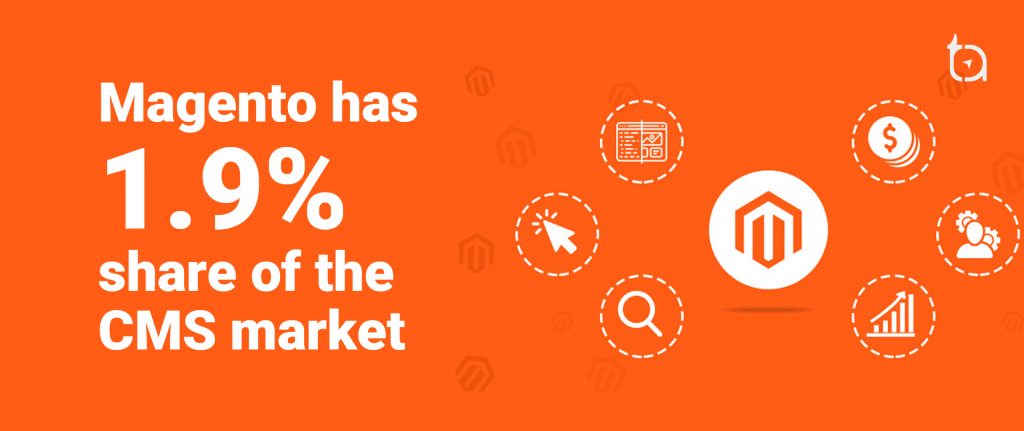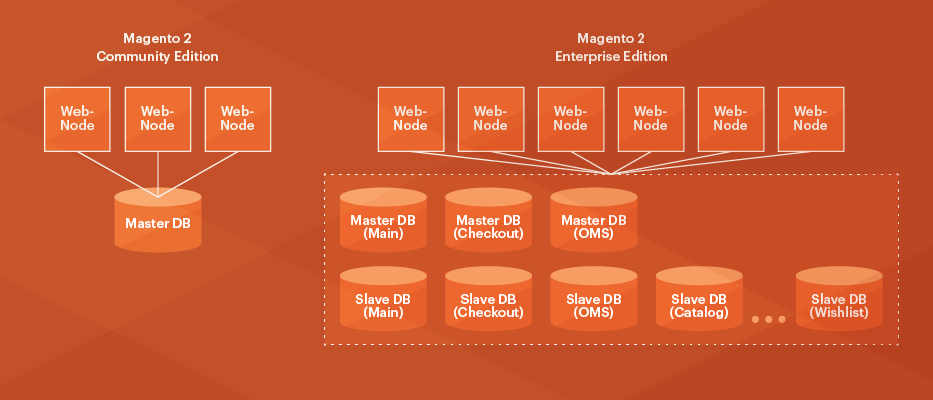An Introduction to Magento, Magento Open-Source & Magento Commerce

Author : John Prabhu 12th Feb 2020

MagentoMagentoMagento is an open-source based e-commerce platform that provides online retailers with an easy and flexible shopping cart system. Also, it gives control over the look, content, and functionality of the online store. is an open-source E-commercee-commercee-commerce is the activity of electronically buying or selling products on online services or over the Internet. platform written in PHPPHPHypertext Preprocessor, fondly called as PHP, is one of the widely used open source scripting language mainly focused on web development which can be embedded into HTML. In addition, it acts as a server-side scripting language as well as a general-purpose programming language.. Magento eCommerce is one of the popular platforms widely used in the technology world. It was developed using the PHP Framework – Zend. Magento offers extreme flexibility in terms of customization.
As an eCommerce entrepreneur, you have to focus on everything such as customer support requests, influx of customer and potential customer data, high traffic levels, cart abandonments, and the new incoming orders that are to be processed for delivery. Magento handles all these tasks effectively and eases your work to a greater extent and is popularly used across the globe.
MAGENTO’S POPULARITY ACROSS THE GLOBE
According to BuiltWith, Magento is the 3rd most popular in the Top 100k sites by traffic in the Open-source category. Out of all the sites that BuiltWith found using eCommerce technology, 9% were using Magento.
Also, according to W3Techs, Magento has a 1.9% share of the CMS market.

Research conducted by Enlyft reflected that Magento has a global market share of 5.35%
31% of Magento customers are in the United States, and 11% are in the United Kingdom.
Also, of all the companies that are using Magento
- 27% are medium-sized
- 16% are large (>1000 employees)
When you look at Magento customers by industry, it is found that
- Retail constitutes 14%,
- Information Technology and Services constitutes 6% and
- Computer Software constitutes 5%
Now the challenge is, there are two versions of Magento. Depending on your needs, you have to choose the right one.
- Magento Open-source
- Magento eCommerce
Consult with our Magento experts to find the right fit for your eCommerce store
1. MAGENTO OPEN-SOURCE
Earlier, MagentoMagentoMagento is an open-source based e-commerce platform that provides online retailers with an easy and flexible shopping cart system. Also, it gives control over the look, content, and functionality of the online store. open-source was released in the name “Magento Community”, which is the free version of Magento and can be self-hosted. It enables you to access a wide array of extensions and themes that are supported by a strong community. Though the options and possibilities are limited in the open-source version, it is sufficient to handle your initial stages of growth.
HERE ARE SOME OF THE FEATURES OF MAGENTO OPEN-SOURCE
- Content Management System (CMS)
- Shipping and Freight Integrations
- PCI Compliant Payment Solutions
- Customer/Order Management System
- Marketing Tools to Promote your Store Online
2. MAGENTO COMMERCE
Magento Enterprise and Magento Enterprise Cloud are the earlier versions of Magento Commerce. You can choose to go with on-premise hosting or cloud-hosting, but the cloud-hosting costs you even more than an on-premise solution.
If you’re planning to go with Magento Commerce 2, you will be paying $22,000/year for the cloud-hosting and for the platform. Again, the prices go up if your store’s Gross Merchandise Volume (GMV) goes beyond $1million. Magento Commerce gives you an edge in the marketing front as well.
HERE ARE SOME OF THE FEATURES OF MAGENTO COMMERCE
Promotion Management
- Send your best customers a coupon for a discount on a specific product
- You can offer free shipping for purchases over a certain amount
- You can schedule promotion for a period of time
Customer Segmentation & Personalization
- Customer segments allow you to dynamically display content and promotions to specific customers, based on properties such as customer address, order history, shopping cart contents, and so on.
- You can target your audience based on the segments and deliver personalized messages that are relevant to the respective segments.
Content Staging
- With Magento eCommerce, you can schedule the content blocks for a custom campaign and preview it before publishing.
Related Product Rules
- You can up-sell and cross-sell a group of products by displaying them as related products in the product page. Each product rule can be associated with a customer segment to produce a dynamic display of products automatically.
Database Sharing
Magento offers:
- Data backup
- Data analysis without affecting the master database
- Scalability

Source: Magento
Page Hierarchy and History
- Your store’s page hierarchy system gives you the ability to organize your content pages and add pagination, navigation, and menus.
Rewards and Loyalty Program
- Magento’s reward points system gives you the ability to implement unique programs that drive customer engagement and promote customer loyalty. You can award points for a wide range of transactions and customer activities, and you can set the configuration to control the point allotment, balance, and expiration. Your customers can redeem the points, and when they cancel a product that was bought using reward points, those reward points will be refunded.
Reporting & Analytics
- Magento Commerce allows you to use Business Intelligence to focus on metrics such as newly registered accounts, top coupon users, customer KPIKPIA performance indicator or key performance indicator (KPI) is a type of performance measurement. KPIs evaluate the success of an organization or of a particular in which it engages. Choosing the right KPIs relies upon a good understanding of what is important to the organization. These assessments often lead to the identification of potential improvements, so performance indicators are routinely associated with 'performance improvement' initiatives tables, etc.
- Reporting gives you access to a suite of dynamic reports that are based on your product, order, and customer data.
- Magento BI account lets you access five different dashboards with approximately 100 reports.
Return Management
- With Return Management Authorization (RMA), merchants can grant return upon request by customers.
Private Sales and Events
- You can create limited-time sales, limit sales to specific members, or create a standalone private sale page.
- It allows you to offer exclusive access to Member Only sales or private sales to increase brand loyalty.
Bluefoot CMS Editor
- With nil technical knowledge, it allows you to create, design, and style CMS pages and blocks using drag & drop editor.
Final Thoughts
If you are planning to migrate to Magento, then depending on the traffic and the GMV of your store, you will be required to choose between Magento Open-source and Magento Commerce. On the other hand, if you are new to the eCommerce business, certain variables such as SEO, Requirement of marketing features, and other criteria play a key role in the decision-making process.
We, at TechAffinity, have an adept team of eCommerce developers who have hands-on experience in developing Magento eCommerce websites (both Magento Open-source and Magento Commerce). Shoot your queries to media@techaffinity.com or schedule a meeting with our experts to discuss further.
